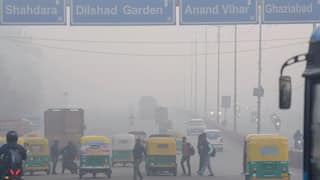Explained: As India Unveils SII's CERVAVAC, Know How Cervical Cancer Vaccines Work
A quadrivalent human papillomavirus vaccine works by stimulating an immune response against 4 different antigens. SII's CERVAVAC is India’s first indigenously developed vaccine against cervical cancer

Pune-based pharmaceutical firm Serum Institute of India (SII) will soon launch CERVAVAC, India’s first indigenously developed Quadrivalent Human Papillomavirus (qHPV) vaccine against cervical cancer. On Thursday, September 1, Adar Poonawalla, CEO of the SII, said at an event in Delhi that the qHPV vaccine will be available in the country in a few months.
Union Minister for Science and Technology Jitendra Singh announced the scientific completion of the qHPV vaccine at Thursday’s event. This means that the research and development activities pertaining to the vaccine are complete, and hence, steps will be taken to make the vaccine available to the public.
When Will CERVAVAC BE Available In India?
Poonawalla said that the vaccine for the prevention of cervical cancer will be affordable and available in the price range of Rs 200 to Rs 400, according to media reports. He further said that CERVAVAC will be administered to people in India first, and later to the world.
The SII is preparing to make 200 million doses of the qHPV vaccine in two years, he added.
The SII Chief said that the vaccine will most likely be launched by the end of the year. He explained that the vaccine will initially be made available through government channels, and next year onwards, some private partners will also be involved.
In July, the Drugs Controller General of India (DCGI) granted market authorisation to SII to manufacture an indigenously developed vaccine for the prevention of cervical cancer.
In India, the second most frequent cancer among women aged 15 to 44 years is cervical cancer. Most cervical cancers are caused by the human papillomavirus, and are sexually transmitted.
CERVAVAC’s Antibody Response
CERVAVAC has demonstrated a robust antibody response against all targeted HPV types, and in all dose and age groups. The response is nearly 1,000 times higher than the baseline.
On June 15, 2022, the DCGI’s Subject Expert Committee (SEC) recommended the qHPV vaccine developed by the SII for cervical cancer patients belonging to the age group of nine to 26 years. Both male and female patients with cervical cancer belonging to this age group can receive the vaccine.
Following the successful completion of the Phase II and Phase III clinical trials for the vaccine, Prakash Kumar Singh, Director, Government and Regulatory Affairs at SII, applied to the DCGI, seeking market approval for the qHPV vaccine.
What Are HPV Vaccines?
HPV vaccines protect against infection caused by human papillomaviruses (HPV), which represent a group of more than 200 related viruses. Of these, more than 40 are spread through direct sexual contact. As many as two HPV types cause genital warts, and about a dozen HPV types can cause certain types of cancer, namely cervical, oropharyngeal, vulvar, vaginal, penile, and anal cancers.
According to the US National Institute of Health's (NIH's) National Cancer Institute, three vaccines that prevent infection with disease-causing HPV are currently being marketed in many countries throughout the world. These are Gardasil, Gardasil 9, and Cervarix.
Gardasil is a quadrivalent vaccine, Gardasil 9 is a nonavalent vaccine, and Cervarix is a bivalent vaccine. This means that Gardasil, Gardasil 9, and Cervarix contain four, nine, and two strains of HPV, respectively.
Gardasil prevents infection against HPV types 6, 11, 16, and 18, and Cervarix prevents infection against HPV types 16 and 18.
Gardasil 9 prevents infection against HPV types 6, 11, 16, 18, 31, 33, 45, 52, and 58.
About 70 per cent of cervical cancers are caused by HPV types 16 and 18.
An additional 10 to 20 per cent of cervical cancers are caused by the high-risk HPV types 31, 33, 45, 52, and 58.
Why Are HPV Vaccines Required?
HPV vaccines are important because they could reduce the impact of cervical cancer and other cancers caused by human papillomaviruses. More than 95 per cent of cervical cancer is caused by sexually transmitted HPVs. This is the fourth most common type of cancer in women globally, with 90 per cent of these women living in low-and middle-income countries.
There are different strains of HPVs which spread through sexual contact. They are associated with most cases of cervical cancer.
Gardasil 9 is the HPV vaccine approved by the US Food and Drug Administration and can be used for both men and women.
If the vaccine is given before a female is exposed to the virus, most cases of cervical cancer can be prevented.
According to Mayo Clinic, males who are vaccinated against the type of HPV associated with cervical cancer may help protect females from the virus by possibly decreasing the risk of transmission.
How Does A Cervical Cancer Vaccine Work?
The SII's tetravalent or quadrivalent HPV vaccine includes L1 virus-like particles (VLPs) of serotypes 6, 11, 16, and 18. A quadrivalent vaccine works by stimulating an immune response against four different antigens, such as four different viruses or other microorganisms. For instance, Gardasil is a quadrivalent vaccine that protects the body against infection with four different types of HPVs. Meanwhile, Gardasil 9 is a nine-drug vaccine which provides protection against HPV types 6, 11, 16, 18, 31, 33, 45, 52, and 58.
The L1 protein is sufficient to form virus-like particles, which are molecules that mimic viruses but are not infectious. These particles are an effective way of creating vaccines against diseases caused by HPVs, hepatitis B virus, among others.
What Does The WHO Say About HPV Vaccines?
According to the World Health Organization (WHO), a single-dose HPV vaccine delivers solid protection against human papillomavirus.
Dr Alejandro Cravioto, Chair of the WHO Strategic Advisory Group of Experts on Immunization (SAGE), said the HPV vaccine is highly effective for the prevention of HPV serotypes 16 and 18, which cause 70 per cent of cervical cancer, according to a statement released by the UN health agency.
SAGE recommends a one or two-dose schedule of HPV vaccine for girls aged nine to 14 years, a one or two-dose schedule for young women aged 15 to 20 years, and two doses with an interval of six months for women above 21 years of age.
Check out below Health Tools-
Calculate Your Body Mass Index ( BMI )







































